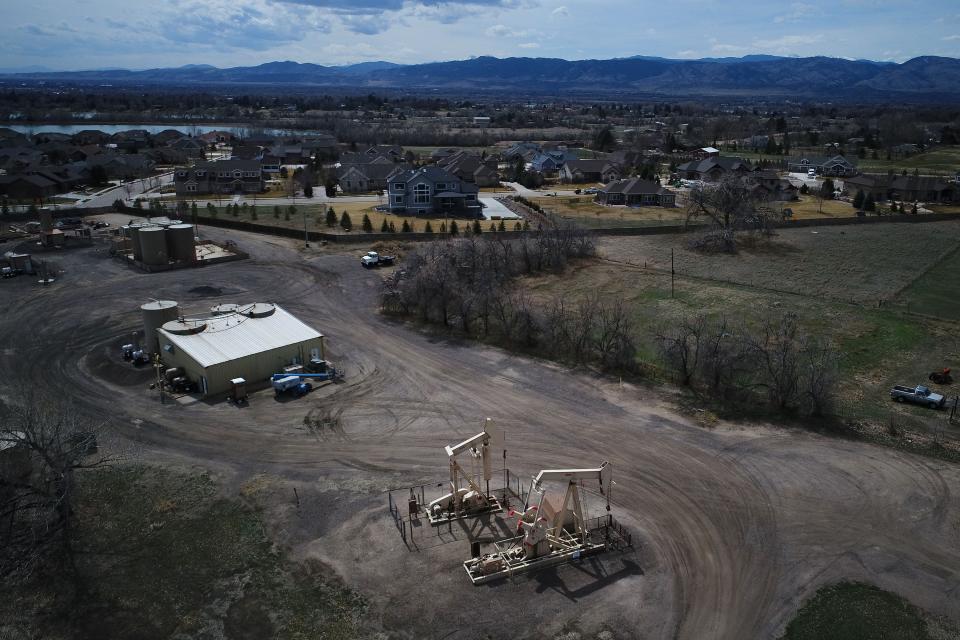Here's how a new bill plans to tackle air pollution from oil and gas in the Front Range
A bill passed by the Colorado General Assembly on Monday, May 6 will give the state more tools to tackle air pollution and hold violators accountable.
As of Friday morning, SB24-229, Ozone Mitigation Measures, was awaiting Gov. Jared Polis' signature to become law.
“Coloradans have suffered for too long from air pollution that harms our health and our quality of life. This bill includes meaningful measures to cut air pollution from the oil and gas sector and hold polluters accountable when they break the rules,” Kirsten Schatz, a clean air advocate at the CoPIRG Foundation, said in a news release. CoPIRG is a nonprofit that advocates for public health.
The Denver metro/north Front Range area has been out of compliance with Environmental Protection Agency ozone standards for several years. In 2022, the EPA downgraded the nonattainment classification in the region from “serious” to “severe” and from “marginal” to “moderate” on the 2008 and 2015 standards, respectively, according to the state.
Exposure to ozone is associated with “increased asthma attacks, increased hospital admissions, increased daily mortality, and other markers of morbidity,” according to the EPA. Symptoms include coughing, throat irritation, chest pain and shortness of breath.
Earlier this year, the Colorado Air Quality Control Commission unanimously approved a regulation to limit the use of certain gasoline-powered lawn and garden equipment.
New Colorado bill seeks to increase accountability, transparency
Here’s what some of the new legislation entails:
SB24-229 will give the Energy and Carbon Management Commission more authority to revoke licenses to conduct oil and gas operations and to hand out larger fines that put into consideration the violator’s history as well as “the violator's corporate affiliates, subsidiaries, and parent organizations,” according to the bill text.
It also sets targets to reduce nitrogen oxides emissions (which react in the atmosphere to form ozone) from upstream oil and gas operations in the nonattainment area, which were first directed by Polis last year. This includes a 30% reduction by 2025 and a 50% reduction by 2030, both relative to 2017 levels.
It increases the funding to the state’s program to mitigate abandoned and low-producing wells (which can still be significant sources of pollution, according to the Environmental Defense Fund).
It will require an annual report that will summarize the state’s enforcement actions as well as creating an email group where the public can sign up for notifications of violations and updates on cases.

Advocate says bill will help 'disproportionately impacted communities'
Ean Tafoya, the Colorado state director at GreenLatinos, said the bill marks progress for the communities that are impacted the most, but more work is still needed.
“I think disproportionately impacted communities benefited the most out of this agreement,” Tafoya said. “There's huge, huge progress including cap and closure of wells, the enforcement, the permitting.”
Under the new bill, the state will hire at least two liaisons “to serve as dedicated resources for disproportionately impacted communities,” according to its website.
It will also “require greater scrutiny of new permits for air pollution sources in areas where people may be at greater risk from the effects of pollution,” according to a previous CoPIRG news release.
“I want to be clear: We still certainly need to have a just transition from oil and gas in the future. But in the interim, I think that these new regulations are going to do a lot to help with air quality issues facing the most impacted communities in the Front Range,” Tafoya said.
While bill takes an 'important step,' more work is needed to tackle air pollution problems
Schatz told the Coloradoan she’s excited to help implement this bill, and she agreed more work is needed to tackle the problem.
“Our air pollution problems or ozone pollution problem, it doesn't just come from one industry or one sector," Schatz said. "We have a lot of ozone from emissions coming from the transportation sector, we've still got a lot of emissions coming from gas-powered lawn and garden equipment. So, there's a lot we want to do."
Regional Air Quality Council Executive Director Michael Silverstein said the council was supportive of the efforts to reduce nitrogen oxides from oil and gas, however, the “approved bill was kind of a compromised piece of legislation.”
He said the council was supportive of a bill that would have also tackled vehicle emissions. And although most of the pollution in the Front Range comes from “background emissions,” he said tackling the other sectors is still important.
“About one-half to two-thirds of the problem is transported into the region. We don't have control over that, but we do have control over the remaining amount," Silverstein said. "So, strategies that reduce emissions from transportation, from off road equipment in the construction sector … as well as oil and gas and other commercial operations are really important, too, as we make progress towards compliance."
He added his office had also worked on HB24-1341, State Vehicle Idling Standard, which was recently signed into law and will “allow local governments to have more flexibility and control over idling emissions.”
Some parts of the Ozone Mitigation Measures bill have specific deadlines (like when to deliver the first enforcement report), but the other provisions “will come into effect as soon as the bill is signed into law,” said Rebecca Curry, a policy counsel at Earthjustice.
“I wouldn't say it's going to necessarily 100% fix our ozone problem,” Curry said. “But it takes a really important step to get us back on track.”
This article originally appeared on Fort Collins Coloradoan: Colorado passes new law to tackle air pollution in the Front Range

